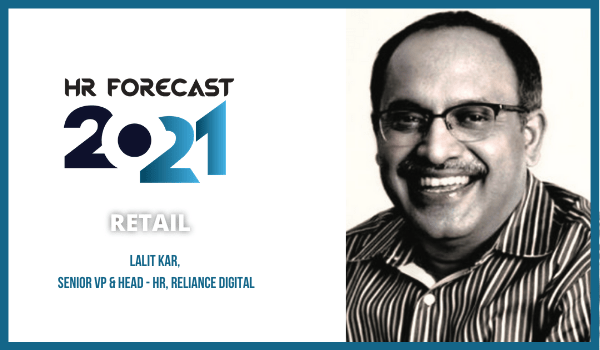2020: What to learn – what to erase
A major paradigm shift has happened in terms of accepting ‘work from home’ (WFH) as a way of life. The pandemic compelled WFH and there was a realisation that this forced choice could turn out to be a better alternative in many ways. Earlier the size of meetings and training programmes was limited by the size of the room or venue. Now a large number of employees can be reached out to. It truly flattened the organisation, as communication by and with leaders became direct. Virtual instructor-led training (VILT) also became a way of learning, enabling training delivery to a large number of participants. The hybrid model is going to be the future. All the job roles will now be categorised into three buckets – Jobs which will call for presence of employees everyday; jobs which will be a combination of working from home for a few days in a week and attending the workplace on some other days; and jobs which can be carried out remotely.
The size of the office will reduce and hence the rentals, accruing a major saving for the companies. The participation and sustainability of women’s employment will increase. The one thing I want to erase from my memory is the scene of ‘reverse migration’ of labour and their families to their villages.
HR has shown great agility and business acumen
In 2020, HR contributed to business continuity in terms of ensuring that every employee is enabled with connectivity to work from anywhere; a safety protocol is introduced and implemented in the workplace; intelligent manpower planning is done for immediate replacement in the event of an infection in the workplace; higher connect and engagement is maintained with employees for the upkeep of their morale; more training and learning opportunities are created; several HR processes such as recruitment, onboarding, induction and so on are reimagined and modified; new businesses are provided complete HR and training support (in Reliance Retail, new businesses such as the e-commerce and B2B2C businesses were added during 2020), and restructuring, remodelling, re-aligning for cost rationalisation and introduction of new employment models, such as gig, freelancers and part timers.
“The criticality of HR will largely depend upon the sector the organisation belongs to and the stage a particular organisation is in”
While HR will not become a business function, it will continue to remain a very important function. The criticality of HR will largely depend upon the sector the organisation belongs to and the stage a particular organisation is in — build-up, growth, maintenance or decadence. In the service sector, people are the most critical resource. Challenges of talent availability, people cost, attrition, performance and so on, compel HR’s involvement in business. The involvement of HR in the build-up and growth stages will continue to be higher. Since the economy is on a path to revival, HR’s involvement will be higher in the coming months.
2021 – changing organisational design
It will all be about organisational design, with technology as an enabler. Gradually, organisations will be a combination of: a core central team, which will provide strategic direction and leadership; technology, which will be employed for repetitive, routine work; analytics, artificial intelligence, big data, cloud and so on; and gig, freelancers and part- timers, who will be increasingly included, as more and more tasks will be performed remotely.
Managing hybrid workforce is more challenging
2020 is a major watershed year. Organisations will now transition into a hybrid model in a major way. With two distinct models – fully remote vis-à-vis fully on-site employees working in one organisation, leaders will be bothered about organisational culture. Whether those working remotely will own the vision, mission and values of the organisation in the same measure as those fully working in office will be the big question. A lot of cultural assimilation and integration programmes and a huge thrust on communication will follow. Gradually, emphasis will be on a ‘results only’ approach. Human resources will end up grappling with designing or amending areas, such as: an effective induction programme for the remote employees so that they do not feel at sea in a new organisation; attendance (availability in true sense), leave policies which could be different for the two types of employees; different compensation and reward policies for two types of employment (one group may be given conveyance allowance for attending work in the office, whereas the other may be given a connectivity allowance); IT and data security policy; POSH – now definition of workplace will include their home or any location they work from; and scope of work, which can be assigned to gig or freelancers as they work for several organisations.



